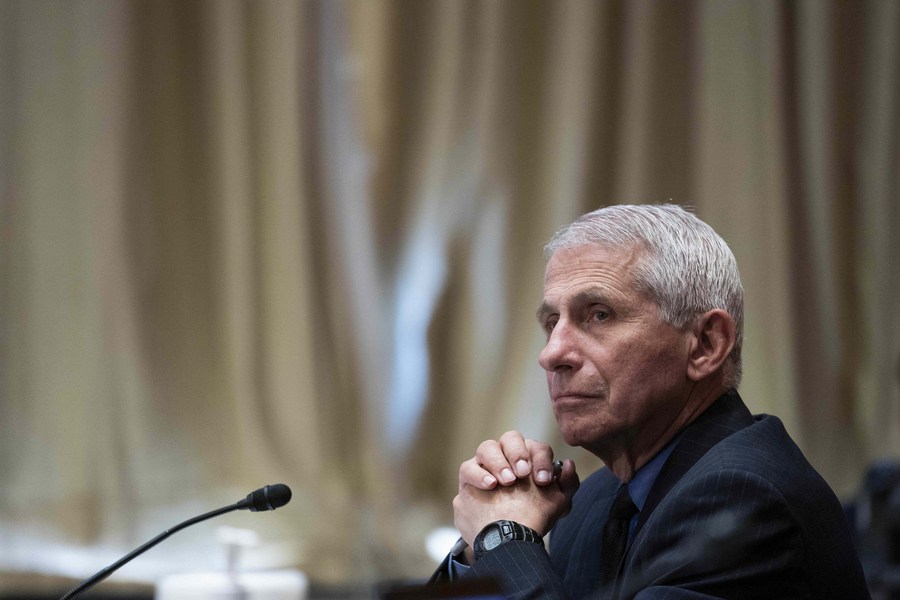U.S. warns of "twindemic" prior to holiday season with COVID-19 pill, booster vaccines in clearance

A man wearing a face mask passes a mural of heart-shaped patterns in the Brooklyn borough of New York, the United States, Oct. 2, 2021.(Photo by Michael Nagle/Xinhua)
As the conditions are improving and the sense of normalcy is expanding, top infectious diseases expert Anthony Fauci alerts that the fight against the pandemic is not over.
NEW YORK, Oct. 11 (Xinhua) -- With holidays approaching in the United States, health experts said some festivities can start to return to a sense of normalcy, but warned that COVID-19 isn't defeated yet and seasonal influenza could launch an attack, despite the federal government's consistent endeavor to vaccinate more Americans against the coronavirus and authorize a new pill and booster vaccines.
"It's a good time to reflect on why it's important to get vaccinated. But go out there and enjoy Halloween as well as the other holidays that will be coming up," Anthony Fauci, director of the National Institute of Allergy and Infectious Diseases, told CNN on Sunday. Outdoor trick-or-treating, particularly for children who are vaccinated, should be fine this year, he said.
Megan Ranney, associate dean of the School of Public Health at Brown University, cautioned against indoor Halloween parties for children too young to be vaccinated and encouraged parents in areas with high virus transmission to mask their children, but agreed that Halloween fun could go on this year.
However, as the conditions are improving and the sense of normalcy is expanding, Fauci still alerted that the fight against the pandemic is not over. "We have to just be careful that we don't prematurely declare victory in many respects. We still have around 68 million people who are eligible to be vaccinated that have not yet gotten vaccinated," he said.

Anthony Fauci, director of the U.S. National Institute of Allergy and Infectious Diseases, listens during a hearing of Senate Appropriations Subcommittee titled "National Institutes of Health's FY22 Budget and the State of Medical Research" in Washington, D.C., the United States, on May 26, 2021. (Sarah Silbiger/Pool via Xinhua)
On Monday, the U.S. Centers for Disease Control and Prevention (CDC) updated that 216,889,814 people have received at least one dose of COVID-19 vaccine, making up 65.3 percent of the whole U.S. population. Fully vaccinated people stood at 187,215,471, accounting for 56.4 percent of the total. A total of 7,786,263 people, or 4.2 percent of fully vaccinated group, received booster shots.
According to The New York Times data analysis, the 7-day average of confirmed cases of the pandemic stood at 96,549 nationwide on Sunday, with the 14-day change striking a 19-percent fall. The COVID-19-related deaths were 2,000 on Sunday, with the 14-day change realizing a 2-percent decrease, with southern U.S. state of Arkansas having added many COVID-19 deaths.
COVID-19 PLUS FLU
Experts are warning that there could be what they call a "twindemic" of COVID-19 and flu this coming winter, reported national broadcaster CBS on Monday. Millions of U.S. children get sick with the flu every year and tens of thousands are hospitalized with respiratory syncytial virus or RSV.
Research being presented at an American Academy of Pediatrics conference showed that pandemic precautions, like wearing masks and social distancing, helped stop the spread of flu and other common respiratory viruses last season, according to the report.
"Although each of these things is not perfect, taken together, they really are effective in preventing illness," William Schaffner, an infectious diseases specialist at Vanderbilt University Medical Center, was quoted as saying.

A man carrying a girl on shoulders goes to a Chicago Cubs' game in Chicago, the United States, on June 11, 2021. (Photo by Joel Lerner/Xinhua)
Last week, The Washington Post reported that U.S. health officials are urging Americans to get their flu shots, warning that the flu season that didn't materialize when most of society was shut down last year could come roaring back and strain hospitals in the months ahead.
Survey data released on Thursday found that slightly more than half of American adults plan to be vaccinated against influenza. That's not much of a change from pre-pandemic surveys conducted by the National Foundation for Infectious Diseases.
"This low flu activity was likely due to the widespread implementation of COVID-19 preventive measures like masks, physical distancing and staying home," CDC Director Rochelle Walensky said in a Thursday briefing announcing flu vaccination efforts.
PILL AND BOOSTERS
On Monday, drugmaker Merck asked the U.S. Food and Drug Administration (FDA) to authorize its pill against COVID-19 in what would add an entirely new and easy-to-use weapon to the world's arsenal against the pandemic. If cleared by the agency, a decision that could come in a matter of weeks, it would be the first pill shown to treat COVID-19. All other FDA-backed treatments against the disease require an intravenous therapy (IV) or injection.
"An antiviral pill that people could take at home to reduce their symptoms and speed recovery could prove groundbreaking, easing the crushing caseload on U.S. hospitals and helping to curb outbreaks in poorer countries with weak health care systems. It would also bolster the two-pronged approach to the pandemic: treatment, by way of medication, and prevention, primarily through vaccinations," reported national broadcaster NBC.
Merck and its partner Ridgeback Biotherapeutics said they specifically asked the agency to grant emergency use for adults with mild-to-moderate COVID-19 who are at risk for severe disease or hospitalization. Merck expects to be able to produce enough pills for 10 million people by the end of this year. The pill is meant to be taken at home as four capsules twice a day for five days, for a total of 40 pills.

Placards display signage for Johnson &Johnson and Pfizer COVID-19 vaccinations at a mobile COVID-19 vaccination center in the Brooklyn borough of New York, the United States, Aug. 18, 2021. (Xinhua/Michael Nagle)
Meanwhile, the U.S. federal government is expected to take a significant step this week toward offering booster doses to a much wider range of Americans as advisers to the FDA meet on Thursday and Friday to discuss recipients of the Johnson &Johnson and Moderna coronavirus vaccines. So far, regulators have authorized booster shots only for certain adults who received the Pfizer-BioNTech vaccine.
"The (U.S. President Joe) Biden administration is eager to shore up the protection provided by all three (officially authorized) vaccines. And federal officials have become increasingly worried in particular about the more than 15 million Americans who received the Johnson &Johnson vaccine, which is less effective than the others," reported The New York Times on Monday.
On Thursday, the FDA advisory panel of vaccine experts will discuss safety and efficacy data regarding booster shots for Moderna recipients. On Friday, the group will discuss Johnson &Johnson boosters. The agency typically issues decisions within a few days of advisory committee meetings. The expert committee will also hear a presentation on Friday from scientists on the effectiveness of mixing different brands of vaccines.
Photos
Related Stories
- Chinese FM calls on UN members to pay dues to ensure normal operation of organization
- Over 2.221 bln COVID-19 vaccine doses administered on Chinese mainland
- Chinese mainland reports 25 new imported COVID-19 cases
- U.S. supply chain prices soar as Logistics Managers' Index sets new records
- U.S. treasury secretary hopes Congress will approve global corporate tax deal
Copyright © 2021 People's Daily Online. All Rights Reserved.










